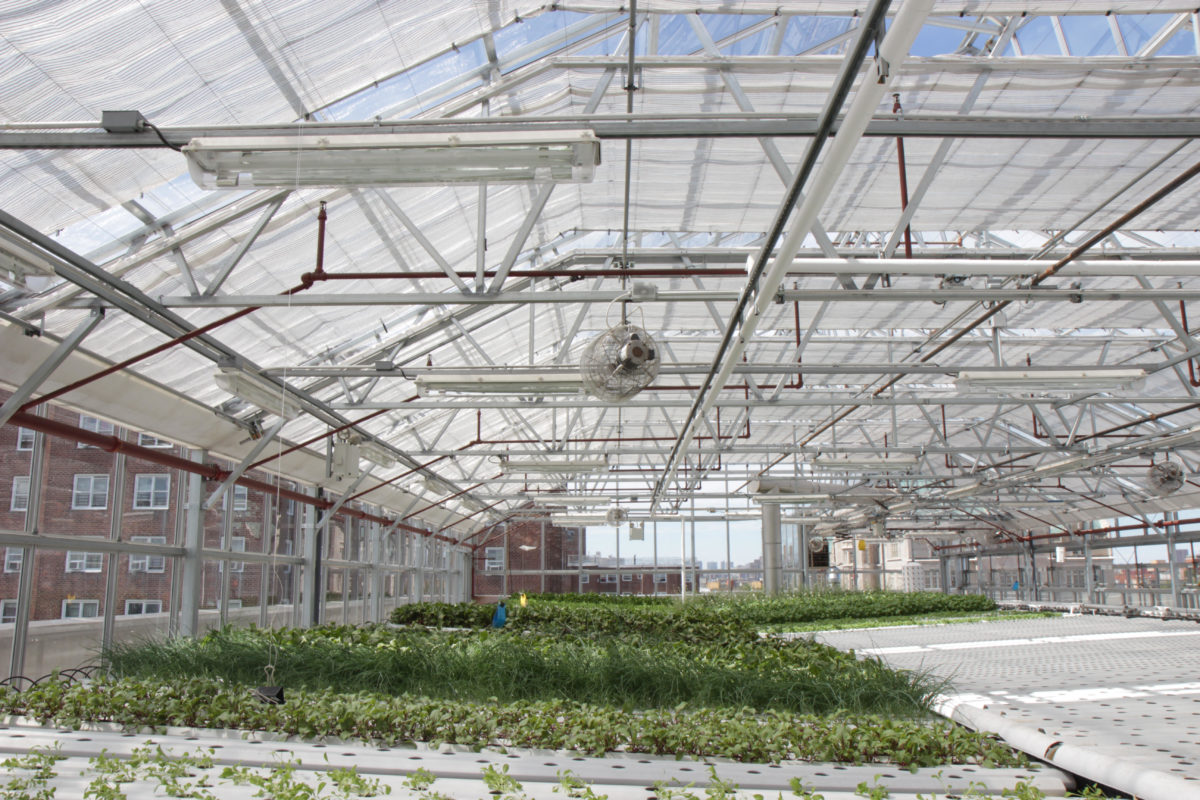The Brooklyn landscape is going green — and not just on rooftop farms. Of late, the borough has seen an explosion of innovation about how to grow fresh, healthy food in the heart of the city.
Digging beds on rooftops and harvesting baby radishes under the summer sun is rather 2010. This year, Blue Planet Consulting will reveal its +farm — a build-it-yourself, modular hydroponic farm unit for the home. Agrilyst is refining its workflow and data management software for indoor farms to automate aspects of the industry. Re-Nuble brought its fertilizer for hydroponic and soil applications derived from wholesale food waste to market in late 2016.
The agriculture technology industry (agtech for short) has seen extraordinary growth in Brooklyn in the past several years. Local entrepreneurs are pushing the boundaries of what urban agriculture looks like despite the fact that New York appears an unexpected home for such disruption in farming space. Nevertheless, Brooklyn has become a fertile environment for the future of food.
But why Brooklyn and not, say, Bakersfield?
It started with farm-to-table. Eaters borough-wide (and further afield) started thinking about where food comes from. Michael Pollan pleaded citizens to “vote with your fork.” “Local” food rose to — and perhaps surpassed — the level of “organic.”
Consumers began to embrace what industry leaders like Dan Barber and Alice Waters had espoused for decades: Where food comes from matters. And Brooklyn has necessary ingredients like the intersection of passionate chefs and a thriving network of farms.
“It’s hard not to be inspired by that pulsing entrepreneurial spirit,” Meg Savage, head of business development at food mag Edible told Technical.ly. “This is a community that cares about it’s food and where it is coming from … and longing for more advances.”

Edenworks microgreens. (Courtesy photo)
For businesses in the agtech space, the consumer and demand side provides plentiful momentum for continued growth and innovation.
“Rather than having a burden on the food system creating this large carbon footprint of having to bring food from as far as California, people are interested in how can we grow the same thing here,” Tinia Pina, founder of the organic fertilizer company Re-nuble said in an interview.
But operators — the industry word for farmers — in the agtech space are thinking about supply, too. Projections suggest the global population will exceed 9.7 billion by 2050. With New York City populations predicted to grow 9.5 percent by 2040, many agtech companies are focused on how to provide fresh and healthy food in ever more dense urban environments. “There is definitely a need to have more resource efficient localized production, distribution and consumption of resources related to food,” said Pina.
Most companies growing high-tech crops focus on leafy greens and fresh herbs. In New York, this makes sense, suggested Allison Kopf, founder of Agrilyst. “We have an interesting agricultural economy where it is a really big agricultural state. But the things that New York can specialize in year-round is very limited because of the climate and different sort of seasonality.”
The first agtech companies cropped up in Brooklyn in the 2009–2011 period. Industry leaders like Edenworks, Gotham Greens and AeroFarms played a key role in laying the groundwork for innovation. “Smaller companies are following suit based on the population and population needs,” said Liz Vaknin, cofounder of Our Name is Farm, a digital and experiential marketing company. “In general, Brooklyn is an open-minded type of place to test out concepts.”

Seeds. (Photo courtesy of @oneminutemeal)
The result is something like an ecosystem.
“Once you have investors and customers then you have technology companies that are interested in selling products to that industry,” said Kopf. “You have companies like us and others sprouting up. A lot of it had to do with the market opportunity that is New York and the supporting resources that needed to exist just sort of do exist [here].”
And ample room for innovation and development remains.
Agtech is still young. Many of the companies involved are just a few years old, if that. Excitement from investors is growing, but solid investment requires education and transparency.
“There is definitely room for more collaboration between operators,” said Re-Nuble’s Pina. “It’s hard, each farm has its own intellectual property that they’re trying to keep defensible so they can raise money. But in driving conversation with local stakeholders at the municipal and corporate levels, we need to work together to show how we can make the supply chain more sustainable.”
Funding is a major concern across the board. “We need intelligent capital especially on the loan side,” said Kopf of Agrilyst. “This is a massive infrastructure investment — far too often farms are trying to secure venture capital. But then banks have to understand the technology. Traditional farm loans don’t work the same way yet.”
Local policymakers are beginning to catch on. The Brooklyn Borough President’s office just announced $2 million in funding for an urban agriculture incubator. Further public infrastructure involvement could be a game changer. “If government money is available, the terms are going to be different than private equity money or venture capital funds,” said Vaknin. “All together, that kind of creates a perfect storm for robust growth.”

Edenworks microgreens. (Courtesy photo)
Join the conversation!
Find news, events, jobs and people who share your interests on Technical.ly's open community Slack
